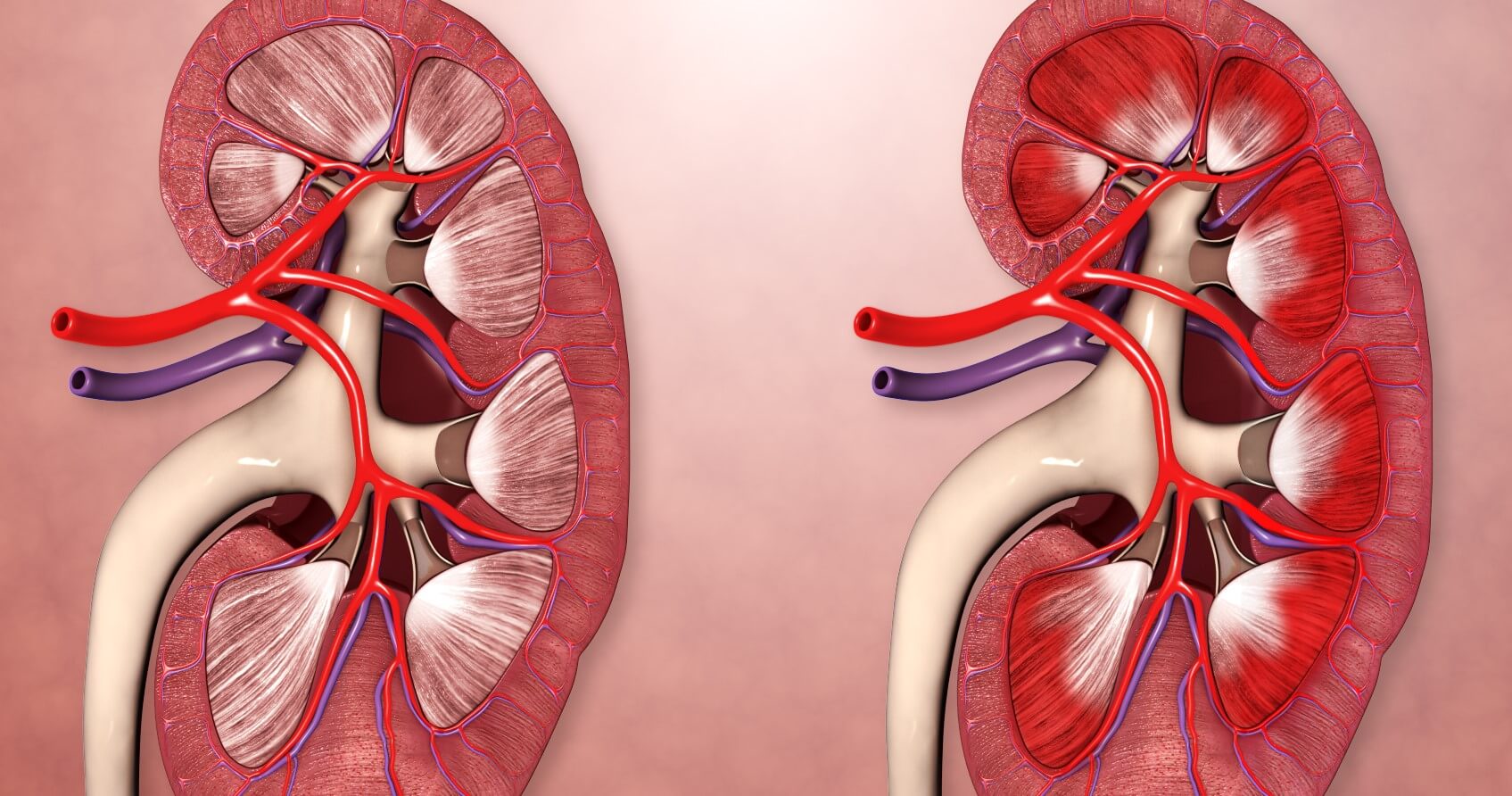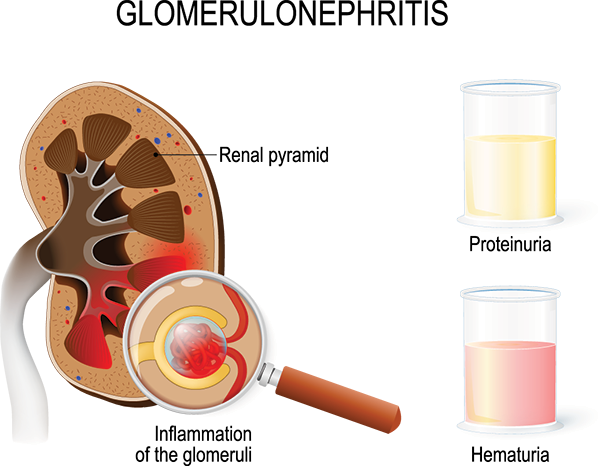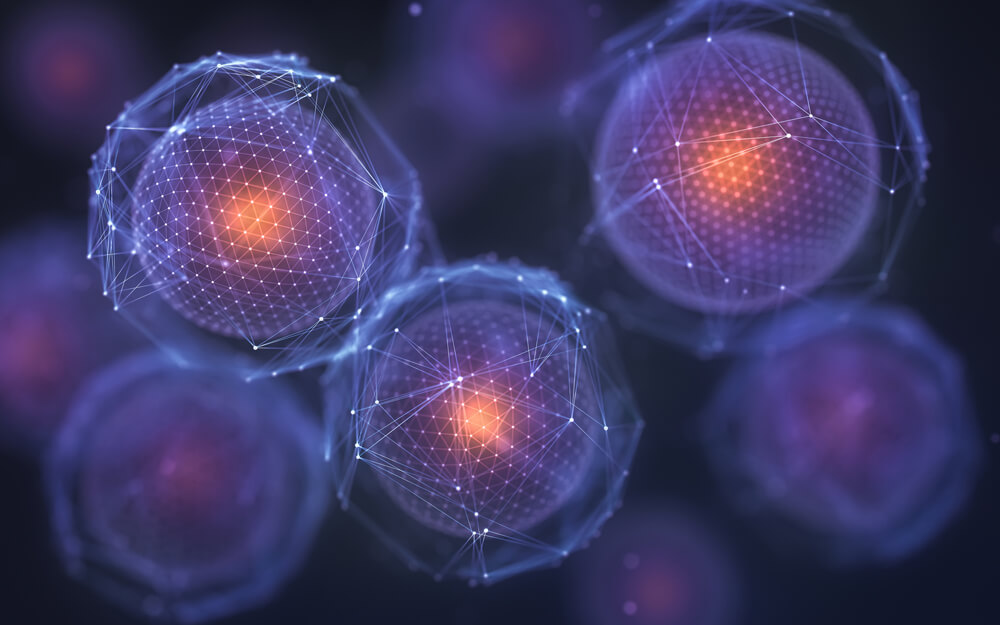Calls for Ukraine
Calls for Europe
Calls for USA

Glomerulonephritis is a disease characterized by inflammation of the glomeruli of the kidneys. These are microstructures thanks to which the kidneys are able to filter and purify the blood. The inflammatory process in the glomeruli can be caused by various factors, such as infections, autoimmune diseases, and taking certain medications.
According to studies conducted by WHO, glomerulonephritis is one of the most common causes of chronic renal failure worldwide. Therefore, an active search for new methods of treating this disease is currently underway, and cell therapy is one of the most promising areas in this area.
The acute form usually develops quickly and may be caused by infection or an autoimmune process. Common symptoms are:

Almost all forms of acute glomerulonephritis tend to progress to a chronic form. It develops slowly, without pronounced symptoms, and in the early stages, can only be detected during diagnostic studies. Main manifestations:
Chronic disease is characterized by irreversible and progressive fibrosis (scarring) of the glomeruli. Ultimately, this leads to a violation of the filtration function of the kidneys. Without the intervention of doctors, patients develop chronic kidney disease, and subsequently end-stage renal disease. Therefore, timely treatment of glomerulonephritis is very important.
Early manifestations may be subtle or mild. These include:
The symptoms of glomerulonephritis listed above are a reason to see a doctor, especially if the patient has risk factors such as: previous infections, autoimmune diseases, diabetes, or cases of the disease in close relatives.
The acute form usually begins suddenly and is accompanied by severe symptoms such as swelling, high blood pressure, protein and blood in the urine. Most often it is caused by streptococcal infection (acute tonsillitis, scarlet fever, streptoderma).
The chronic form progresses slowly and develops gradually over several months or years. It can be caused by various factors: repeated infections, autoimmune diseases, genetic predisposition. Symptoms appear late. These can be: edema, increased blood pressure, fatigue, loss of appetite, sleep disturbance, etc. Chronic glomerulonephritis often leads to kidney failure, and therefore requires special medical attention.
Pyelonephritis is an inflammation of the kidney. It is most commonly caused by an ascending urinary tract infection that reaches the renal pelvis. Glomerulonephritis is the inflammation of the glomeruli of the kidneys. It can result from a bacterial infection of the throat, skin, or tooth abscess.
The symptoms of both diseases are similar. The difference lies in the fact that with pyelonephritis, urination, as a rule, becomes more frequent, and with inflammation of the glomeruli, it becomes less frequent. However, the correct diagnosis can only be made by a doctor after a comprehensive examination.

Diagnostic examination may include the following laboratory and instrumental tests:
Immunological tests for antibodies and immune cells are also sometimes performed to determine the type of glomerulonephritis and its cause.
The therapeutic strategy includes the following treatments:
For example, in ANCA-associated glomerulonephritis (a progressive type of disease caused by necrotizing vasculitis), standard therapy helps only in 70% of cases. That is, 30% of patients remain at risk of dialysis and death from kidney failure within 5 years. However, most early deaths are caused by the side effects of drugs. The main cause is infections that develop against the background of suppression of the immune system by immunosuppressants.
Therefore, there is now an active search for new, safer and more effective methods of treatment. And one of the most promising of these is stem cell therapy.

For a long time it was believed that the restoration of renal tissue occurs solely due to the division of the cells of the kidney itself. Recently, however, scientists have found that hematopoietic (hematopoietic) stem cells are also actively involved in the regeneration process. In addition, a number of studies have shown that mesenchymal stem cells (MSCs), present in bone marrow, adipose tissue, and blood, also help repair damaged kidney tissue.
Scientists continue to study stem cells, but there is already evidence that has helped to determine the possible mechanisms of their therapeutic action in glomerulonephritis:
When using the patient’s own cells, regenerative therapy is easily tolerated and does not cause side effects. Stem cells are extracted from the patient’s bone marrow, adipose tissue, or blood, then multiplied in the laboratory and reintroduced into the bloodstream.
MedTour company cooperates with the best medical centers for the treatment of kidney diseases around the world. We currently offer a unique opportunity for stem cell therapy for glomerulonephritis. If you are interested in innovative treatment, call one of the phones listed on the site or fill out the feedback form. The medical coordinator will contact you as soon as possible and select the clinic that best suits your individual needs.
Andriy Kovalchuk, biotechnologist, candidate of medical sciences, director of the stem cell bank of TOV “Genome”, head of the bank of umbilical cord blood, tissues and human cells on the basis of the Gorbachevsky National Medical University, spoke about the latest achievements and features of regenerative medicine.
To learn more about the possibilities of cell therapy for kidney diseases, get a free consultation from a MedTour coordinating doctor.
Can a damaged kidney recover?
The kidney is an organ with a relatively low cellular regenerative potential. However, new methods of regenerative therapy have shown promising results, proving that stem cells are actively involved in the process of regeneration of damaged kidney tissue.
How to define chronic glomerulonephritis?
The chronic form differs from the acute form by a slow, asymptomatic onset. The patient usually does not have symptoms such as back pain and fever. Instead, he may feel weak, tired, and notice swelling and decreased urine output. An accurate diagnosis can only be made by an experienced nephrologist.
How to overcome glomerulonephritis?
In recent years, new alternative therapies have emerged that can help manage the disease. One of them is regenerative stem cell therapy. Potentially, it stimulates the repair of kidney tissues damaged by inflammation.
How to treat autoimmune glomerulonephritis?
Standard therapy involves taking corticosteroids and immunosuppressants. But there are also alternative methods. In the course of research, cell therapy showed a pronounced immunomodulatory effect. Stem cells help protect the kidneys from misguided attack by the immune system.
Please rate the work of MedTour
